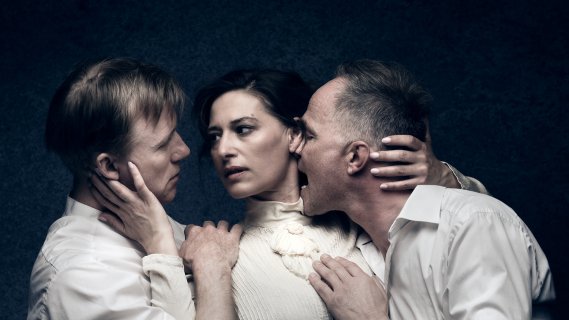

Peter Brook
English theatre and film director Peter Brook was the first person to win the International Ibsen Award, in 2008.
Brook successfully demonstrates that all significant theatre has a unique ability to bring people together, that culture is something everyone can appreciate, and that no group or nation can claim ownership of a work of literature, either in the form of words or as performed on stage.
Throughout his career Mr Brook has explored and extended the boundaries of theatre, and has played a central role in the development of this medium for over half a century. His productions have travelled all over the world and been enjoyed by thousands of audiences; his theatre in Paris, Bouffes du Nord, has attracted thousands more; and further thousands have benefited from his influence through the work of directors and other groups who have been inspired by his ideas as director, teacher and visionary.
Peter Brook was born in London in 1925, of Russian–Jewish parents who had emigrated from Dvinsk in Latvia (then part of Russia) in 1914. Peter’s interest in theatre and film was evident from an early age and was encouraged by his family. He made his first film, A Sentimental Journey, at the age of 19, and a year later he directed his one and only Ibsen play, The Lady from the Sea. In 1946 he directed Shakespeare’s Love’s Labour’s Lost in Stratford-upon-Avon, a theatre to which he was to return again and again throughout his career. Brook’s diversity and originality were evident from the first. He has been described as a teenage prodigy and a provocative enfant terrible, but he was also a gifted director of witty and entertaining productions like comedies, operas and the successful musical Irma la Douce. His repertoire during the first part of his career, from 1945 to the early 1960s, shows clearly that he never felt comfortable in the English theatre climate of the 1950s. Neither John Osborne’s Look Back in Anger nor Arnold Wesker’s Roots attracted him. He was interested in the ideas of Jean-Paul Sartre and Jean Anouilh, and directed several plays by both these writers.
Brook’s ideal is and always has been Shakespeare. Shakespeare’s plays have given him the freedom to move between the outer and the inner world, between fantasy and reality. They transcend the local arena and allow him to pursue his search for universal theatre – a theatre of no particular country but of all countries, cultures, languages and traditions.The search took form during the following vital years, from Shakespeare’s King Lear in 1962 to A Midsummer Night’s Dream in 1970. In their different ways these productions had a profound influence on the development of theatre, and continue to serve as a reference point for our interpretation of Shakespeare: on the one hand King Lear’s pitiless vision of the end of a life – Shakespeare seen through the eyes of Samuel Becket – and on the other A Midsummer Night’s Dream in its circus setting, with its sense of magic, playfulness and celebration of the imagination that appeal to adults and children alike. Between these two poles lay his ground-breaking production of Peter Weiss’s Marat/Sade. Brook’s synthesis of Artaud’s Theatre of Cruelty and Brecht’s dialectic and social criticism was a masterly example of total theatre.
During the sixties Brook also experimented with a freer relationship between director and actors, questioning the whole nature of direction. In the same year as the première of A Midsummer Night’s Dream he moved to Paris and founded the multicultural International Centre for Theatre Research. Here he built up an ensemble of actors from a diversity of countries and cultures, here he planned together with Jean-Claude Carrière the 11-hour epic The Mahabharata, and here, in the dilapidated theatre Bouffes du Nord, he directed one after another of his most memorable works, such as The Conference of the Birds, The Cherry Tree and La Tragédie de Carmen. In 1995 he directed another innovative piece of theatre: Qui est lá? (“Who’s there?”, the opening line in Hamlet). Mixed in with scenes from the play, the actors discuss theories of acting, citing Stanislavsky, Artaud, Brecht, Meyerhold, Craig and Seami. Brook himself is an indisputable addition to this illustrious list. Few directors have done as much as Brook to push back the boundaries of theatre – national, ethnic and religious.
The International Ibsen Prize was a recognition of his success in demonstrating that all significant theatre has a unique ability to bring people together, that culture is something everyone can appreciate, and that no group or nation can claim ownership of a work of literature, either in the form of words or as performed on stage.
